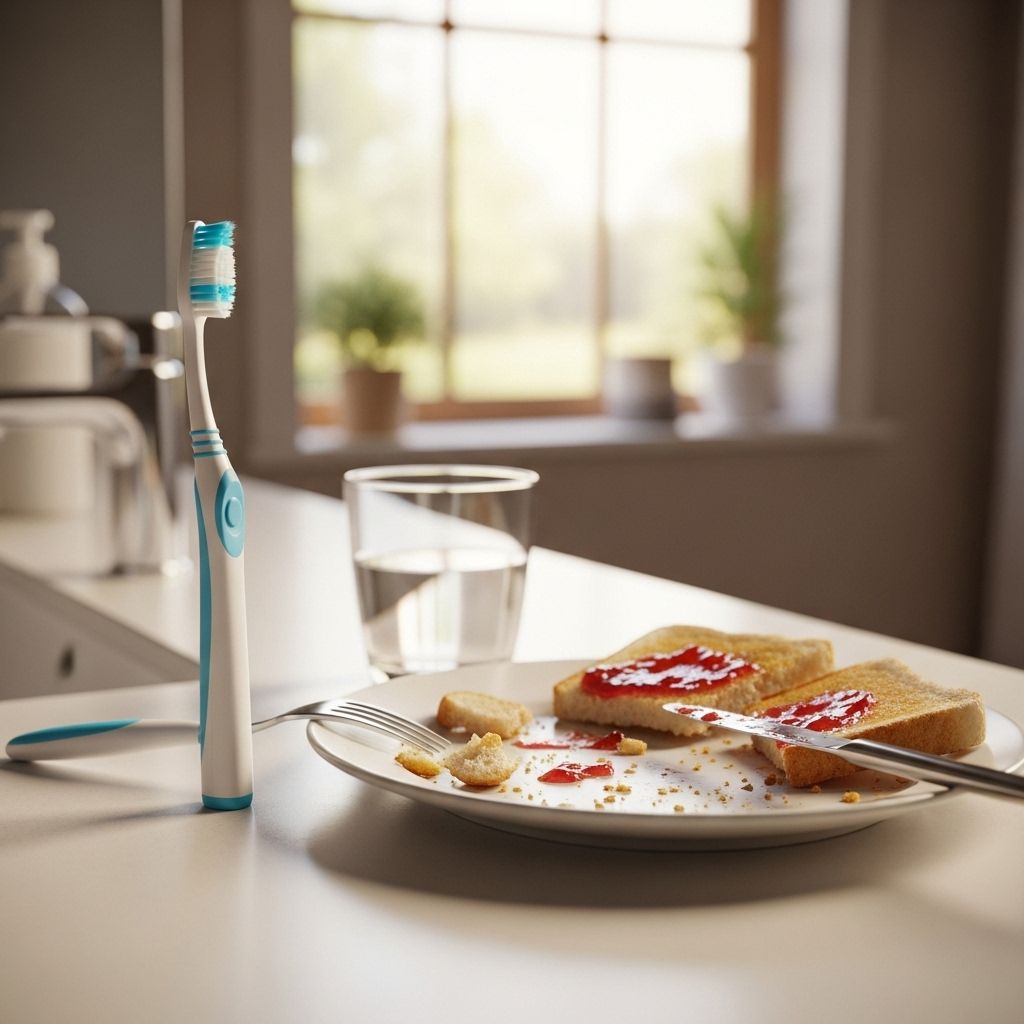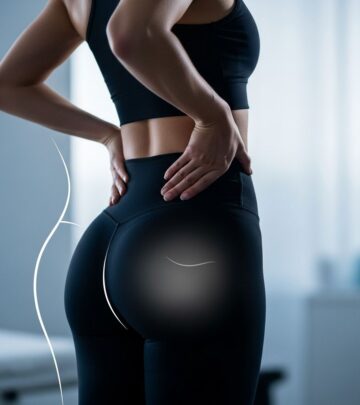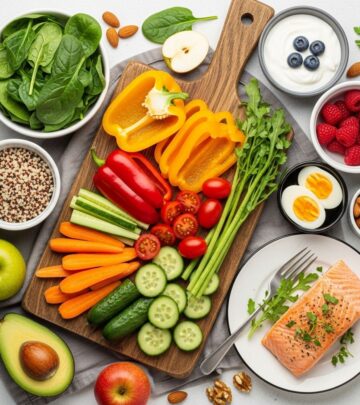Should You Brush Your Teeth Before or After Breakfast?
Start the day by boosting saliva flow to fight acid erosion and build stronger enamel.

You greet every morning with a toothbrushing routine, but have you ever wondered if the timing of that brush impacts more than just your breath? Dental professionals increasingly suggest that when you brush could be as important as how you do it. Morning oral care is crucial for protecting both dental and overall health, and optimizing your routine can boost long-term wellness.
Why “When” Matters: The Mouth’s Overnight Changes
Oral care isn’t only about removing food particles. Overnight, the mouth undergoes biological changes that set the stage for morning brushing:
- Reduced saliva flow during sleep means less natural cleaning and higher bacteria buildup.
- Bacteria feed on leftover sugars and carbohydrates, producing acids that attack gum and tooth enamel.
- Morning breath and sticky plaque are visible reminders of nighttime bacterial activity.
- People who breathe through their mouths at night—rather than their noses—experience even drier oral tissues and increased plaque accumulation.
Understanding these overnight changes provides insight into why and when to brush for optimal protection.
Should You Brush Before or After Breakfast?
Both leading dental experts and organizations agree that brushing your teeth before breakfast is usually the best choice for most people. Here’s why:
- Removes overnight plaque and bacteria: Brushing when you first wake up eliminates the buildup from the night, reducing the risk of tooth decay and gum disease.
- Applies a protective fluoride layer: Brushing before eating coats teeth with fluoride and other strengthening minerals, defending enamel against acid attacks from breakfast foods.
- Boosts saliva production: The act of brushing triggers saliva flow, which helps neutralize acids, begin digestion, and further clean your mouth.
According to Anjali Rajpal, DMD, and Steven J Katz, DDS, brushing before breakfast is particularly effective at reducing morning breath and safeguarding against cavity-forming bacteria.
Risks of Brushing After Breakfast
- Eating breakfast—especially acidic or sugary foods (orange juice, citrus, pastries)—temporarily softens enamel.
- Brushing too soon after eating can further weaken enamel, as the abrasive motion combined with acid exposure may accelerate wear.
- The American Dental Association recommends waiting at least 30–60 minutes before brushing if you’ve eaten acidic foods.
That doesn’t mean you can never brush after breakfast, but the timing matters. If your schedule or habits require a post-meal brush, rinse your mouth with water right after eating and wait half an hour before cleaning teeth.
Brushing Before Breakfast: The Science and Advantages
- Removes overnight bacteria: Without saliva’s protective rinsing, bacteria multiply at night, consuming sugars and carbs to make acids that erode enamel and inflame gums.
- Protective mineral layer: Morning toothpastes with fluoride, calcium phosphate, or hydroxyapatite apply minerals that strengthen enamel before breakfast acids arrive.
- Saliva boost: Brushing increases saliva flow for several minutes, which helps break down food and kill harmful bacteria when you eat breakfast next.
- Clean slate: You start your day with a “reset” mouth, affecting breath, taste, and dental health.
People with dry mouth or those who breathe through their mouth overnight especially benefit from brushing immediately after waking.
Brushing After Breakfast: When and How to Safeguard Enamel
If brushing after breakfast best fits your lifestyle, take these precautions:
- Wait 30–60 minutes after eating (especially after acidic foods like orange juice, coffee, fresh fruit, or pastries).
- Rinse with water immediately after your meal to help neutralize food acids and reduce their impact on enamel.
- Chew sugar-free gum to stimulate saliva production and further neutralize mouth acids.
- Once the waiting period is up, brush gently and thoroughly using fluoride toothpaste.
If you have exposed roots, thin enamel, or sensitive teeth, frequent or poorly timed brushing could aggravate discomfort, so consult your dentist for an optimized routine.
How to Brush Your Teeth for Best Results
No matter when you brush, technique is as important as timing for oral health.
- Wet your toothbrush with a small amount of water and add a pea-sized dab of fluoride toothpaste.
- Angle the brush at about 45 degrees to the gum line, using gentle circular or elliptical motions.
- Brush for a full two minutes, making sure to clean all surfaces—outer, inner, and chewing—of every tooth.
- Brush your tongue to remove additional bacteria and freshen breath.
- Spit out the toothpaste; rinsing with a small amount of water is optional unless advised otherwise by your dentist.
Consider using an electric toothbrush, which can more effectively remove plaque for many people.
Best Practices for Your Morning Oral Health Routine
- Brush first: If possible, brush upon waking to clean away bacteria and coat teeth with protective minerals.
- Eat breakfast: Enjoy your meal as usual.
- Rinse with water: If concerned about debris or breath after eating, a vigorous rinse helps clear remaining food particles and acids.
- Optional second brush: If brushing after eating, wait 30–60 minutes to avoid damaging softened enamel, then clean gently.
- Floss daily: Remove trapped particles between teeth at least once a day, preferably before bed or after your breakfast meal.
If you wear braces or dental prosthetics, work with your dentist to time your oral hygiene carefully and avoid excessive abrasive action.
Breakfast Foods That Affect Dental Health Most
Some breakfast staples are particularly tough on teeth—especially when followed by immediate brushing:
- Citrus juices (orange, grapefruit, lemon)
- Fresh fruit (pineapple, strawberries)
- Dried fruit
- Breads and pastries (especially sticky or sugary types)
- Sugary cereals
- Coffee (acidic and may stain)
The high acidity and sugar content soften tooth enamel and feed bacteria that cause decay. Rinsing and waiting after these foods is especially important.
The Connection Between Oral and Overall Health
Dental care isn’t just about preserving your smile. Research increasingly links oral health to systemic wellbeing:
- Studies associate poor dental hygiene with higher risks of heart disease, stroke, and lung disorders.
- Uncontrolled gum disease may increase risks for diabetes and worsen blood sugar regulation.
- Oral bacteria have been implicated in cognitive decline and negative brain health outcomes.
- Persistent inflammation and infection in the mouth may undermine immune function elsewhere in the body.
Regular brushing, flossing, and dental checkups safeguard more than just your teeth—they protect your whole body.
Table: Pros and Cons of Brushing Before vs. After Breakfast
| Timing | Pros | Cons |
|---|---|---|
| Before Breakfast |
|
|
| After Breakfast |
|
|
*Waiting period may be inconvenient for busy mornings
Tips for Optimal Dental Hygiene
- Brush for a full two minutes, twice daily—before breakfast and before bed for most people.
- Use a soft-bristled toothbrush and replace it every 3–4 months.
- Floss at least once daily to remove interdental debris.
- Consider mouthwash that contains fluoride or antibacterial agents.
- Schedule regular dental checkups and professional cleanings.
- If you experience sensitivity, exposed roots, or concerns about brushing timing, seek professional advice.
Frequently Asked Questions (FAQs)
Q: Is it really harmful to brush after breakfast?
Brushing immediately after acidic breakfasts can erode softened enamel. Waiting at least 30–60 minutes helps your saliva remineralize and protect tooth surfaces before brushing.
Q: Why does toothpaste make juice taste so strange?
Most toothpastes contain sodium lauryl sulfate, which temporarily blocks sweet taste receptors—making juices and other foods taste bitter when consumed right after brushing.
Q: Should I brush again if I eat a late-morning snack?
If you snack between meals, consider rinsing with water or chewing sugar-free gum. Brushing more than twice daily isn’t usually necessary unless specifically recommended by your dentist.
Q: How can I freshen my breath if I don’t brush after breakfast?
Mouth rinses, water, or chewing sugar-free gum help clear food debris and stimulate saliva, maintaining fresher breath until your next scheduled brushing.
Q: I have sensitive teeth. What can I do?
Use fluoride toothpaste for sensitive teeth and a soft-bristled brush. Avoid brushing immediately after eating acidic or sugary foods, and consult your dentist for further guidance.
Key Takeaways
- Brushing before breakfast is generally safest and most protective.
- If you must brush after breakfast, wait at least 30–60 minutes—especially after acidic foods.
- More important than timing is brushing thoroughly, using proper technique, and maintaining regular dental appointments.
Adopting a mindful, well-timed brushing routine fosters lifelong dental health and supports your overall wellbeing.
References
Read full bio of medha deb












